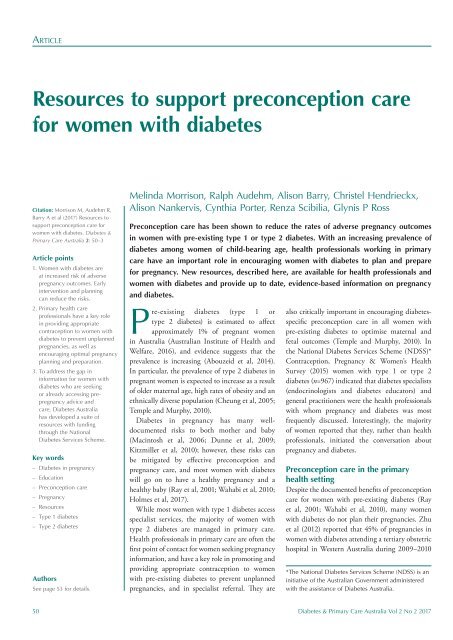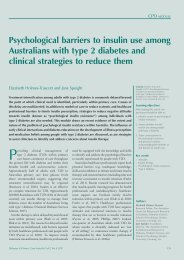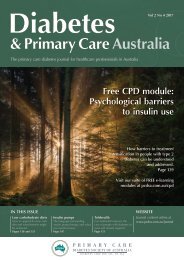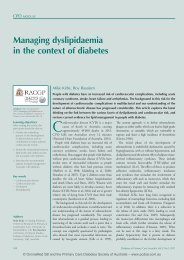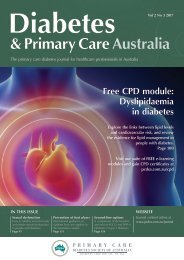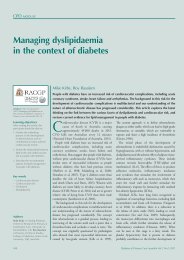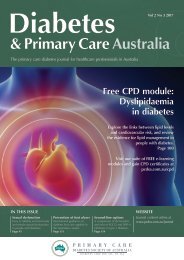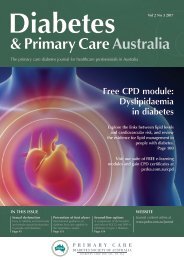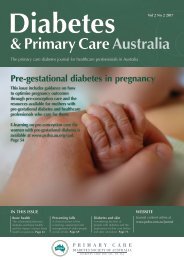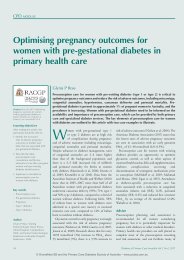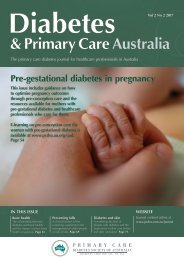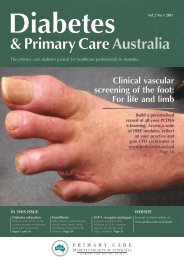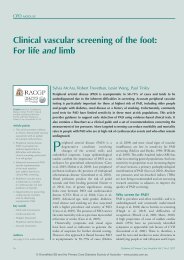DPCA2-2_issue_v2
Create successful ePaper yourself
Turn your PDF publications into a flip-book with our unique Google optimized e-Paper software.
Article<br />
Resources to support preconception care<br />
for women with diabetes<br />
Citation: Morrison M, Audehm R,<br />
Barry A et al (2017) Resources to<br />
support preconception care for<br />
women with diabetes. Diabetes &<br />
Primary Care Australia 2: 50–3<br />
Article points<br />
1. Women with diabetes are<br />
at increased risk of adverse<br />
pregnancy outcomes. Early<br />
intervention and planning<br />
can reduce the risks.<br />
2. Primary health care<br />
professionals have a key role<br />
in providing appropriate<br />
contraception to women with<br />
diabetes to prevent unplanned<br />
pregnancies, as well as<br />
encouraging optimal pregnancy<br />
planning and preparation.<br />
3. To address the gap in<br />
information for women with<br />
diabetes who are seeking<br />
or already accessing prepregnancy<br />
advice and<br />
care, Diabetes Australia<br />
has developed a suite of<br />
resources with funding<br />
through the National<br />
Diabetes Services Scheme.<br />
Key words<br />
– Diabetes in pregnancy<br />
– Education<br />
– Preconception care<br />
– Pregnancy<br />
– Resources<br />
– Type 1 diabetes<br />
– Type 2 diabetes<br />
Authors<br />
See page 53 for details.<br />
Melinda Morrison, Ralph Audehm, Alison Barry, Christel Hendrieckx,<br />
Alison Nankervis, Cynthia Porter, Renza Scibilia, Glynis P Ross<br />
Preconception care has been shown to reduce the rates of adverse pregnancy outcomes<br />
in women with pre-existing type 1 or type 2 diabetes. With an increasing prevalence of<br />
diabetes among women of child-bearing age, health professionals working in primary<br />
care have an important role in encouraging women with diabetes to plan and prepare<br />
for pregnancy. New resources, described here, are available for health professionals and<br />
women with diabetes and provide up to date, evidence-based information on pregnancy<br />
and diabetes.<br />
Pre-existing diabetes (type 1 or<br />
type 2 diabetes) is estimated to affect<br />
approximately 1% of pregnant women<br />
in Australia (Australian Institute of Health and<br />
Welfare, 2016), and evidence suggests that the<br />
prevalence is increasing (Abouzeid et al, 2014).<br />
In particular, the prevalence of type 2 diabetes in<br />
pregnant women is expected to increase as a result<br />
of older maternal age, high rates of obesity and an<br />
ethnically diverse population (Cheung et al, 2005;<br />
Temple and Murphy, 2010).<br />
Diabetes in pregnancy has many welldocumented<br />
risks to both mother and baby<br />
(Macintosh et al, 2006; Dunne et al, 2009;<br />
Kitzmiller et al, 2010); however, these risks can<br />
be mitigated by effective preconception and<br />
pregnancy care, and most women with diabetes<br />
will go on to have a healthy pregnancy and a<br />
healthy baby (Ray et al, 2001; Wahabi et al, 2010;<br />
Holmes et al, 2017).<br />
While most women with type 1 diabetes access<br />
specialist services, the majority of women with<br />
type 2 diabetes are managed in primary care.<br />
Health professionals in primary care are often the<br />
first point of contact for women seeking pregnancy<br />
information, and have a key role in promoting and<br />
providing appropriate contraception to women<br />
with pre-existing diabetes to prevent unplanned<br />
pregnancies, and in specialist referral. They are<br />
also critically important in encouraging diabetesspecific<br />
preconception care in all women with<br />
pre-existing diabetes to optimise maternal and<br />
fetal outcomes (Temple and Murphy, 2010). In<br />
the National Diabetes Services Scheme (NDSS)*<br />
Contraception, Pregnancy & Women’s Health<br />
Survey (2015) women with type 1 or type 2<br />
diabetes (n=967) indicated that diabetes specialists<br />
(endocrinologists and diabetes educators) and<br />
general practitioners were the health professionals<br />
with whom pregnancy and diabetes was most<br />
frequently discussed. Interestingly, the majority<br />
of women reported that they, rather than health<br />
professionals, initiated the conversation about<br />
pregnancy and diabetes.<br />
Preconception care in the primary<br />
health setting<br />
Despite the documented benefits of preconception<br />
care for women with pre-existing diabetes (Ray<br />
et al, 2001; Wahabi et al, 2010), many women<br />
with diabetes do not plan their pregnancies. Zhu<br />
et al (2012) reported that 45% of pregnancies in<br />
women with diabetes attending a tertiary obstetric<br />
hospital in Western Australia during 2009–2010<br />
*The National Diabetes Services Scheme (NDSS) is an<br />
initiative of the Australian Government administered<br />
with the assistance of Diabetes Australia.<br />
50 Diabetes & Primary Care Australia Vol 2 No 2 2017


